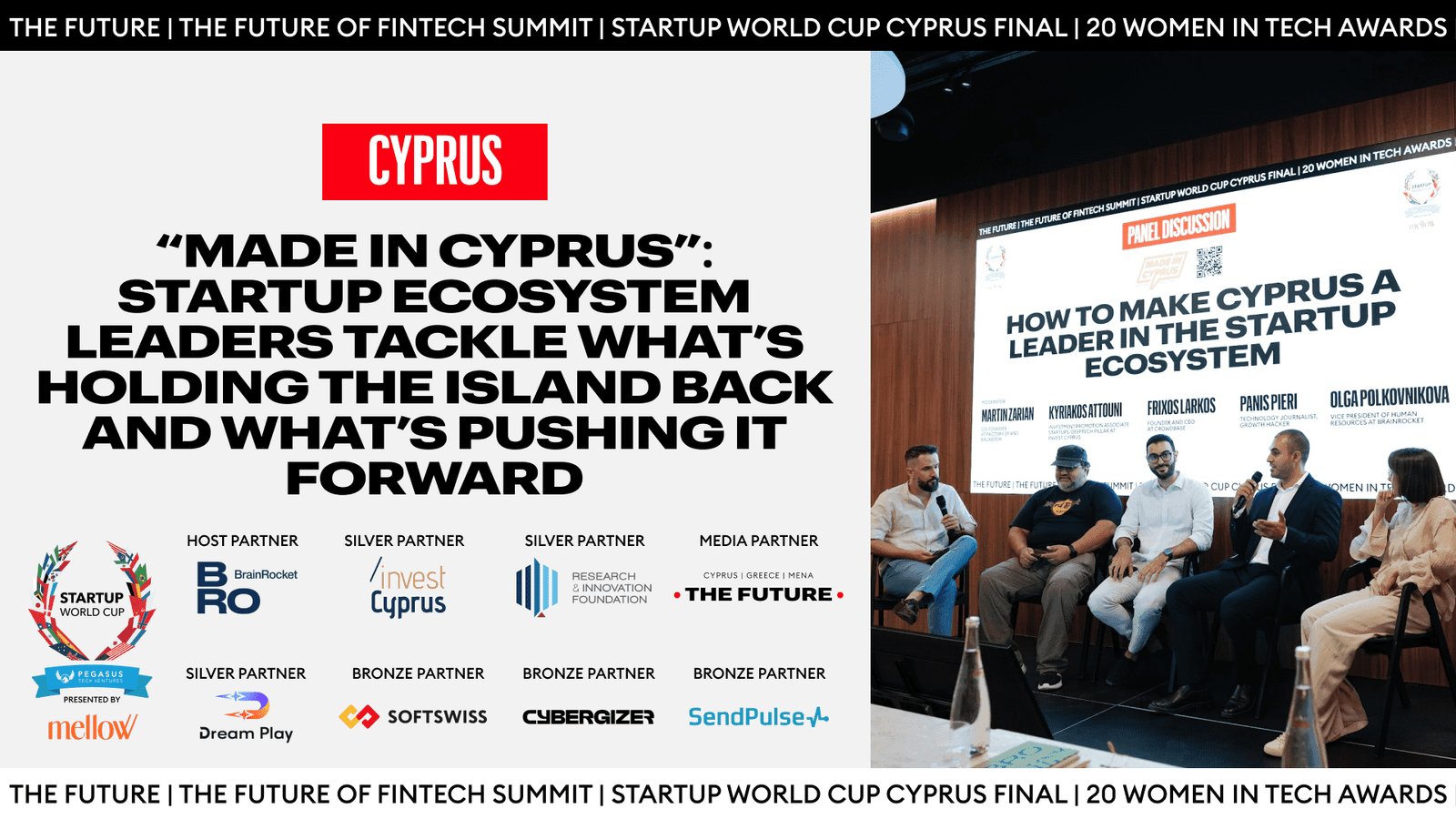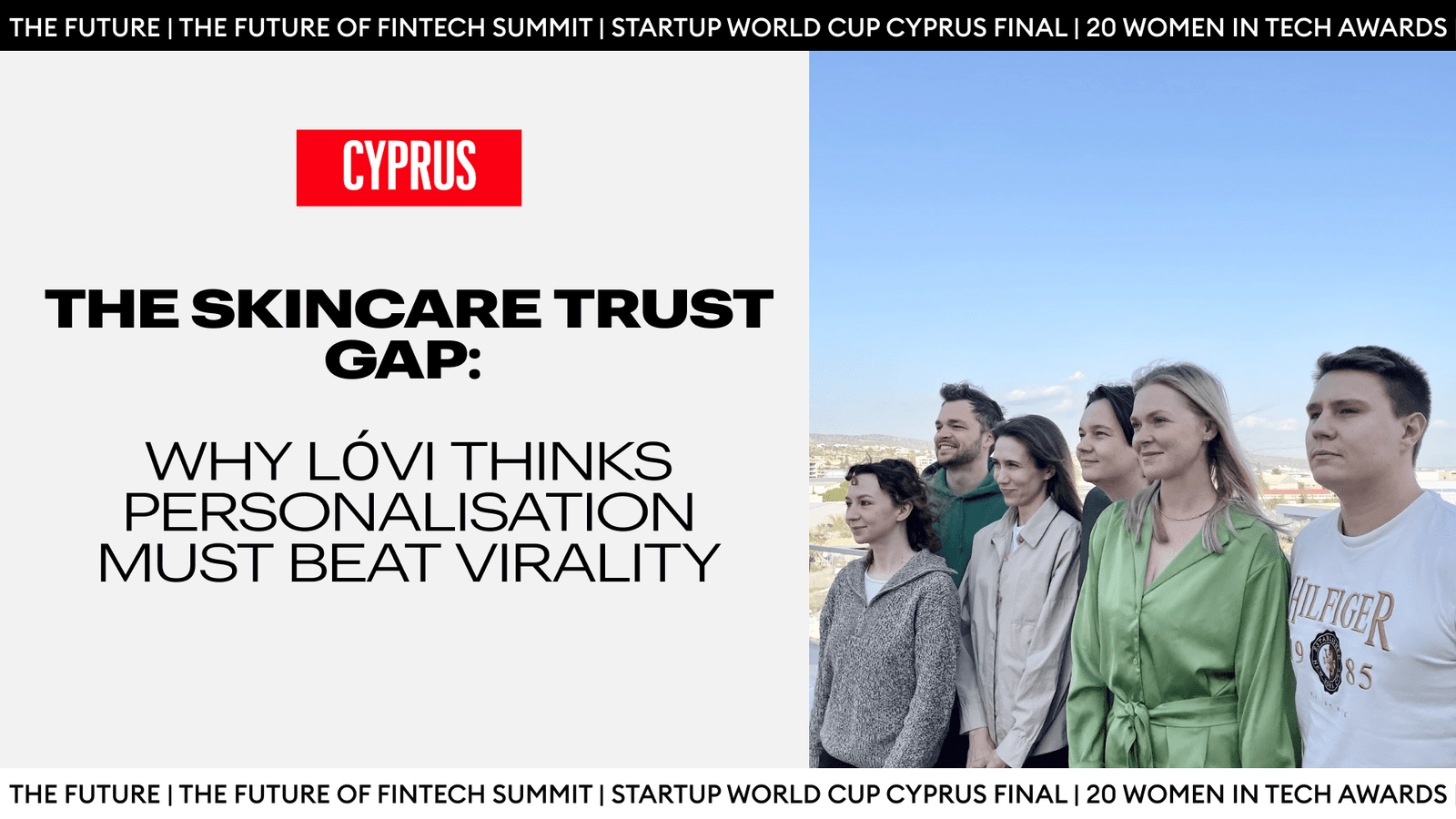If Uri Levine set the tone with his keynote on building billion-dollar startups, the first panel discussion at the Startup World Cup Cyprus Regional Final 2025 took a turn inward, asking a bold but necessary question: Can Cyprus become a real startup hub, or is it just a playground for the privileged?
Moderated with irreverent charm by brand strategist Martin Zarian, the panel titled “Made in Cyprus: How to Make Cyprus a Leader in the Startup Ecosystem” brought together four distinct voices from across the island’s innovation spectrum:
Follow THE FUTURE on LinkedIn, Facebook, Instagram, X and Telegram
- Kyriakos Attouni from Invest Cyprus
- Frixos Larkos, CEO and co-founder of Crowdbase
- Panis Pieri, long-time startup journalist at Panis.News
- Olga Polkovnikova, from BrainRocket
Over the course of an hour, they tackled everything from public sector sluggishness and education reform to the (un)surprising shortage of halloumi.
Cyprus: Paradise for Lifestyle, Purgatory for Public Transport
The conversation kicked off with a rapid-fire icebreaker: three things the panelists love and hate (or, at least, dislike) about Cyprus. The answers were as entertaining as they were revealing. Predictably, lifestyle, weather (340 days of sunshine!), a dynamic international community, and hospitality topped the “love” list. However, panelists were equally candid about the challenges that continue to hinder progress. Among the most frequently mentioned issues were:
- Inadequate public transport and poor infrastructure for pedestrians
- A lack of green spaces and sustainable urban planning
- Bureaucratic inefficiencies and entrenched corruption
- Persistent gender inequality in the business ecosystem
“We don’t have pedestrians. We have parking spots where pedestrians should be,” said Polkovnikova with a smile.
“Tax Haven” or Talent Hub?
“I’ve been asking that question for 10 years,” said Pieri. His answer? Somewhere in the middle. Cyprus is growing, tech already makes up 7% of GDP, but “startups” remain a subset within that, not the whole pie.
The panelists agreed that the influx of expats and international tech firms has outpaced the country’s infrastructure and policy evolution. The result?
“The truth is somewhere in the middle,” Pierri said, referring to the country’s reputation as both a tax-efficient jurisdiction and an emerging tech destination. He recalled how, in earlier years, Cyprus relied heavily on IP tax incentives (offering a 2.5% effective rate) to attract companies.
But panelists stressed that the country can no longer rely solely on fiscal advantages. The focus must now turn to enabling innovation, streamlining bureaucracy, and cultivating a robust entrepreneurial culture.
Talent: Import vs Grow
Polkovnikova described BrainRocket’s experience relocating over 800 employees from more than 20 countries to Cyprus. The company invests heavily in integration: handling visas, housing, schooling, and even employment for spouses.
While this shows Cyprus’s appeal to international talent, the panel discussed how local talent development remains underwhelming. Larkos highlighted the enduring emphasis on traditional professions: “We still have this very monolithic mentality of, let’s become lawyers, accountants.”
He and others called for education reform to encourage entrepreneurial thinking and reduce the stigma around failure, which is a key cultural barrier to innovation.
Village Mentality
One consistent concern was the lack of cohesion in Cyprus’s startup landscape. Larkos described it as a “village mentality” where different cities and communities operate in isolation. This fragmentation, both geographic and social, weakens ecosystem synergies between locals and expats, and between sectors.
The panel agreed: promoting greater collaboration is essential. More events, more community building, more cross-regional initiatives.
Thinking Beyond Borders
Another recurring theme was Cyprus’s limited market size. Larkos emphasized the danger of startups building only for the local context: “If you do something just for Cyprus, it’s going to be very small.”
Testing MVPs locally is useful, he reported, but startups must adopt a global perspective from the outset. This ambition must be reflected in product design, scaling strategy, and storytelling.
On that last point, Pieri added that Cypriot founders often struggle to clearly articulate their value propositions. Stronger communication and pitch training, he said, are necessary to compete internationally.
Investment Climate and Policy Reform
Attouni discussed how investor expectations in Cyprus have evolved over the last decade. While large family businesses once dominated the landscape, risk-oriented capital is gaining ground. He spoke about the growing base of innovators building globally focused companies from Cyprus.
However, key challenges remain. These include banking inefficiencies, slow company registration procedures, and an underperforming stock exchange, all of which hinder startup growth and exit opportunities.
Larkos suggested that the current growth phase presents an opportunity: while the ecosystem is still maturing, strategic reforms and targeted investment could yield significant returns.
Outlook: Assembly Required
The panel concluded on a cautiously optimistic note. Cyprus has many of the necessary ingredients: talent, climate, community, and an increasing appetite for innovation. What it still lacks is integration, scale, and the policy scaffolding to accelerate the startup sector to global competitiveness.
As Zarian noted in closing, the parts are there. But building a thriving startup ecosystem will require assembling them quickly, strategically, and inclusively.














